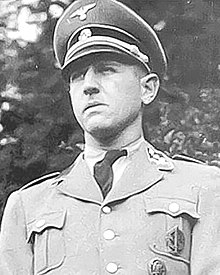|
Theodor Dannecker
Theodor Dannecker (27 March 1913 – 10 December 1945) was a German SS-captain (Hauptsturmführer), a key aide to Adolf Eichmann in the deportation of Jews during World War II. A trained lawyer, Dannecker first served at the Reich Security Main Office in Berlin before being sent to France as specialist on Nazi anti-Jewish policies (Judenberater). Throughout the war Dannecker oversaw the implementation of the Final Solution sending Jewish men, women and children from France (1942), Bulgaria (1943), Italy (1944) and Hungary to Auschwitz concentration camp. Captured in 1945 by American soldiers, he committed suicide in prison. Early lifeAfter completing trade school, the Tübingen-born Dannecker first worked as a textile dealer until 1932 when he joined the Nazi Party and the SS. In 1934 he became a member of the SS-Verfügungstruppe (SS-VT), an independent unit of political combat troops at the disposal of the Nazi Party. In the same year he was a guard at the Columbia-Haus in Berlin, one of the first German concentration camps, and enlisted into the SS-Wachverband V Brandenburg, a precursor of the SS-Totenkopfverbände (SS-TV) operating in Oranienburg and Columbia-Haus concentration camps.[2] A year later he was assigned to the SS Security Service (Sicherheitsdienst; SD). In March 1937 Dannecker became a collaborator of Adolf Eichmann in the Department of Jewish Affairs within the SD.[3] Second World WarFrom September 1940 until July 1942, Dannecker was leader of the Judenreferat at the SD office in Paris, where he ordered and oversaw round ups by French Police. More than 13,000 Jews were deported to Auschwitz concentration camp where most were murdered in the Final Solution.[4] Owing to misuse of his position, partially due to his theft of German confiscated property, he was ordered back to Berlin in August 1942. On 21 January 1943 he was sent to Sofia to assist the Bulgarian government, an ally of Nazi Germany, with the deportation of Jews.[5] Dannecker was the highest German official in charge of the Holocaust, in the Bulgarian territories.[6] During March 1943, Bulgarian military and police authorities deported 11,343 Jews from the Bulgarian-occupied regions of Macedonia, Pomoravlje in occupied Yugoslavia and Thrace to Auschwitz-Birkenau and Treblinka.[7] Most were murdered in the gas chambers or shot, only 12 survived.[8] However, his attempt to deport Jews with Bulgarian citizenship from Bulgaria proper failed due to widespread opposition by Bulgarian intellectuals, the heads of the Bulgarian Orthodox Church, Metropolitan Bishops Stephan from Sofia and Kiril from Plovdiv as well as from the deputy speaker of the parliament Dimiter Peshev all demanding a halt to the deportations; these actions eventually forced Boris III of Bulgaria to change his mind and cancel the deportations in May 1943.[7] Dannecker continued to deport Italian Jews between September 1943 and January 1944, when Italy surrendered to the Allies and Germans occupied Italy.[9] Before the German occupation, Benito Mussolini refused to turn over Jews to the Nazis except those in areas annexed or occupied by the Italians in the Balkans. Not seen as efficient enough, he was replaced in this role by Friedrich Boßhammer, who was, like Dannecker, closely associated with Adolf Eichmann.[1][10] After Germany occupied Hungary, Dannecker and the Hungarian establishment (not the Arrow Cross, which came to power only in October 1944) deported more than a half a million Hungarian Jews between early 1944 and summer of the same year. Dannecker developed under Eichmann into one of the SS's most ruthless and experienced experts on the "Jewish Question", and his involvement in the genocide of European Jewry was one of primary responsibility.[11] A passage from a 1942 report by Dannecker illustrates how the "Jewish Question" was handled in France:
SuicideAt the end of the war in Europe, Dannecker eluded capture, possibly using false identification and was being hidden by his wife in Bad Tölz. In December 1945, Dannecker was arrested by the United States Army. On 10 December 1945 he committed suicide in a prison camp before he was tried.[13] See alsoReferences
Sources
Further reading
|
||||||||||||||||||||||||
